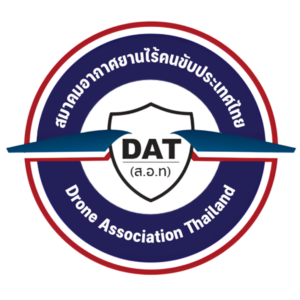The increasing use of drones worldwide has led countries to implement regulations to ensure safety and order. Today, we will delve into the differences between drone laws in Thailand and other interesting countries.
Drone laws in Thailand: What pilots need to know.
Drone registration
In Thailand, drones weighing 250 grams or more must be registered with the NBTC. They are categorized into 5 types based on their purpose: hobby, competition, entertainment, commercial, and research.
Flight restrictions
- Flying over 90 meters is prohibited.
- Flying is prohibited within a 9-kilometer radius of airports.
- Flying over restricted areas such as government buildings is prohibited.
- Drones must be flown within visual line of sight at all times.
- Flying at night is prohibited.
Drone laws in the United States.
Registration
The FAA (Federal Aviation Administration) requires drones weighing between 250 grams and 25 kilograms to be registered, categorized as follows:
- Recreational category
- Commercial category
Flight restrictions
- Flying over 120 meters is prohibited.
- Must fly within line of sight.
- Do not fly over crowds.
- Must obtain special permission for night flying.
Drone laws in the European Union (EU)
The European Union Aviation Safety Agency (EASA) has established standardized regulations across the EU, categorizing drones based on risk:
Categorization
- Open Category (Low Risk)
- Specific Category (Medium Risk)
- Certified Category (High Risk)
Special Requirements
- Must register the pilot and the drone.
- Must complete online training.
- Must have a Remote ID system.
- Compulsory insurance is required.
Provide translation
Thailand
- Maximum fine of 100,000 THB
- Imprisonment not exceeding 1 year
United States of America
- Maximum fine of 250,000 USD
- Imprisonment not exceeding 3 years
สหภาพยุโรป
- Penalties depend on each member state.
- Maximum fine may reach 100,000 EUR
Interesting differences
- Strictness of enforcement
- Thailand: Focuses on registration and flight control
- Foreign countries: Focus on licensing systems and training
- Insurance system
- Thailand: Not yet mandatory
- EU and Japan: Mandatory insurance required
- Commercial flight operations
- Thailand: Must obtain special permission on a case-by-case basis
- United States: Has a clear licensing system
- EU: Categorized by risk type
Future trends in drone laws
- Increased stringency in safety measures
- Development of the Remote ID system
- Enforcement of mandatory insurance
- Updating regulations in line with advancing technology
Recommendations for drone pilots
- Study the laws thoroughly before flying.
- Check no-fly zones in advance.
- Obtain insurance even if not mandatory.
- Keep proof of registration with you.
- Regularly follow changes in laws.
Summary
Comparing drone laws between Thailand and other countries shows that each country has different regulatory focuses, but they share the common goal of ensuring airspace safety. Drone pilots should thoroughly study the laws before flying, especially when operating drones abroad.
